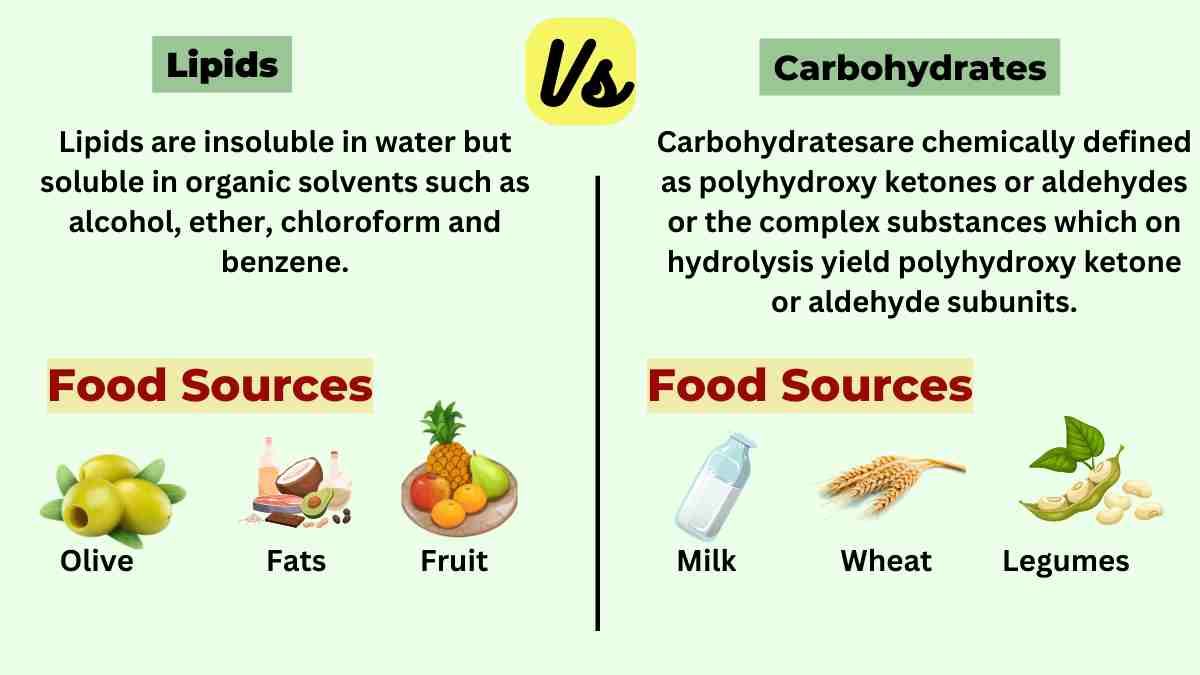The key difference between carbohydrates and lipids is that carbohydrates are the source of energy in living organisms rather lipids are used to store this energy.

What is Carbohydrate?
Carbohydrates are chemically defined as polyhydroxy ketones or aldehydes or the complex substances which on hydrolysis yield polyhydroxy ketone or aldehyde subunits. Carbohydrates are organic compounds composed of carbon, hydrogen, and oxygen. Hydrolysis involves breakdown of large molecules into small molecules by utilizing water molecule.
They serve as a primary source of energy for the body, playing a vital role in various physiological processes. Common dietary sources of carbohydrates include grains, vegetables, and legumes.
They are categorized into simple sugars (monosaccharides and disaccharides) and complex carbohydrates (polysaccharides), each with different rates of digestion and impact on blood sugar levels.
What is Lipid?
Lipids are a diverse group of organic compounds found in living organisms. Lipids belongs to fatty acids. Lipids are insoluble in water but soluble in organic solvents such as alcohol, ether, chloroform and benzene. Common types of lipids include fats, oils, phospholipids, and steroids.
Lipids serve essential functions such as energy storage, cell membrane structure, and signaling within the body. They play a vital role in maintaining overall health and are crucial components of a balanced diet.
Carbohydrate vs Lipids
The key difference between lipids and carbohydrates is given below:
| Carbohydrates | Lipids | |
| Solubility | Soluble in water | Insoluble in water |
| Function | Carbohydrates are primarily an energy source for organisms. | Lipids serve various functions in the body. They are an efficient energy storage form, providing more energy per unit mass compared to carbohydrates. |
| Structure | Carbohydrates are composed of carbon, hydrogen, and oxygen, but they have a specific ratio of hydrogen to oxygen atoms, usually 2:1 (as in the general formula CH2O). | Lipids are a diverse group of molecules that are primarily composed of carbon, hydrogen, and oxygen. |
| Storage | Lipids are stored as triglycerides in specialized cells called adipocytes in animals and as oils in plants. | Carbohydrates are stored in the form of glycogen in animals, primarily in the liver and muscles. |
| Utilization | Glycogen can be rapidly broken down into glucose through glycogenolysis to meet the body’s energy demands. Plants store carbohydrates as starch in their tissues. | They provide a long-term energy reserve and can be broken down through a process called lipolysis to release energy when needed. |
| Energy Efficiency | Carbohydrates provide around 4 calories per gram when metabolized. | Lipids yield more energy per gram when metabolized compared to carbohydrates. They provide approximately 9 calories per gram. |
